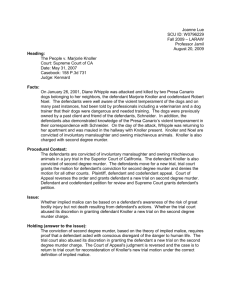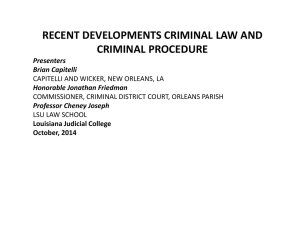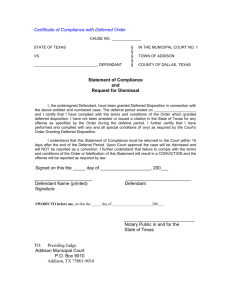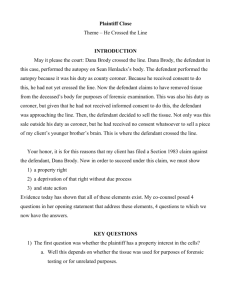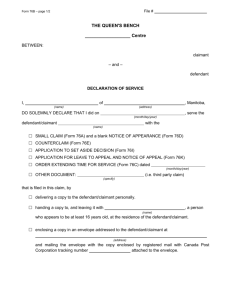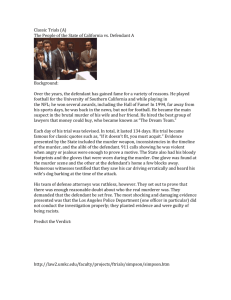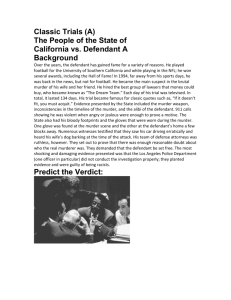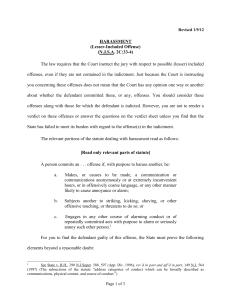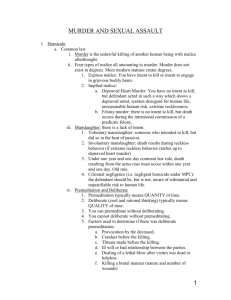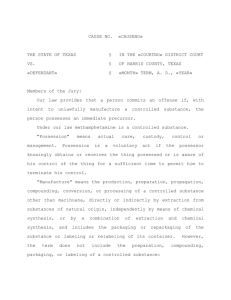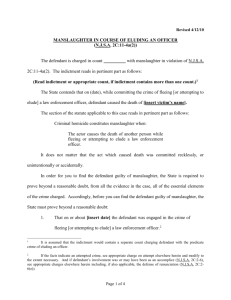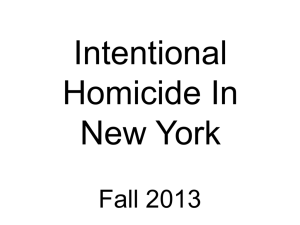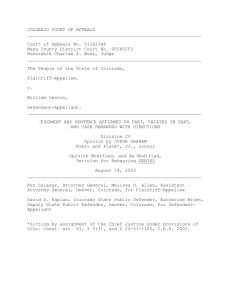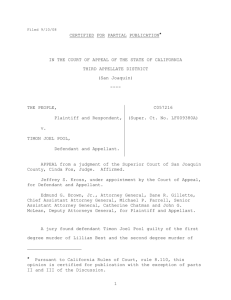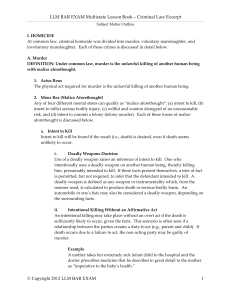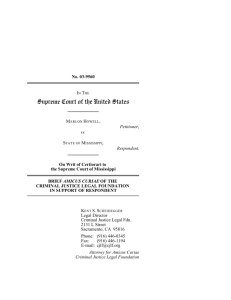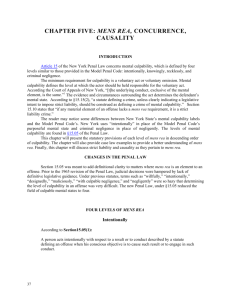2C:11-3b(4) - New Jersey Courts
advertisement
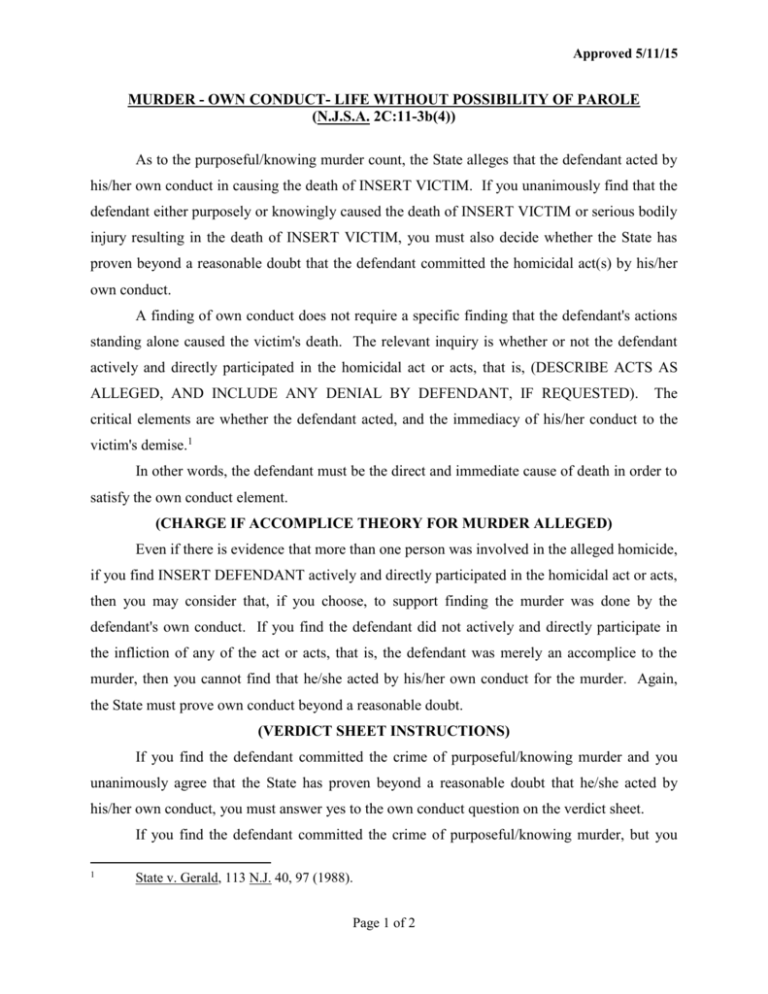
Approved 5/11/15 MURDER - OWN CONDUCT- LIFE WITHOUT POSSIBILITY OF PAROLE (N.J.S.A. 2C:11-3b(4)) As to the purposeful/knowing murder count, the State alleges that the defendant acted by his/her own conduct in causing the death of INSERT VICTIM. If you unanimously find that the defendant either purposely or knowingly caused the death of INSERT VICTIM or serious bodily injury resulting in the death of INSERT VICTIM, you must also decide whether the State has proven beyond a reasonable doubt that the defendant committed the homicidal act(s) by his/her own conduct. A finding of own conduct does not require a specific finding that the defendant's actions standing alone caused the victim's death. The relevant inquiry is whether or not the defendant actively and directly participated in the homicidal act or acts, that is, (DESCRIBE ACTS AS ALLEGED, AND INCLUDE ANY DENIAL BY DEFENDANT, IF REQUESTED). The critical elements are whether the defendant acted, and the immediacy of his/her conduct to the victim's demise.1 In other words, the defendant must be the direct and immediate cause of death in order to satisfy the own conduct element. (CHARGE IF ACCOMPLICE THEORY FOR MURDER ALLEGED) Even if there is evidence that more than one person was involved in the alleged homicide, if you find INSERT DEFENDANT actively and directly participated in the homicidal act or acts, then you may consider that, if you choose, to support finding the murder was done by the defendant's own conduct. If you find the defendant did not actively and directly participate in the infliction of any of the act or acts, that is, the defendant was merely an accomplice to the murder, then you cannot find that he/she acted by his/her own conduct for the murder. Again, the State must prove own conduct beyond a reasonable doubt. (VERDICT SHEET INSTRUCTIONS) If you find the defendant committed the crime of purposeful/knowing murder and you unanimously agree that the State has proven beyond a reasonable doubt that he/she acted by his/her own conduct, you must answer yes to the own conduct question on the verdict sheet. If you find the defendant committed the crime of purposeful/knowing murder, but you 1 State v. Gerald, 113 N.J. 40, 97 (1988). Page 1 of 2 MURDER - OWN CONDUCT- LIFE WITHOUT POSSIBILITY OF PAROLE N.J.S.A. 2C:11-3b(4) find that the State did not prove beyond a reasonable doubt that he/she acted by his/her own conduct, you must answer no to the own conduct question on the verdict sheet.2 2 The "own conduct" trigger for a sentence of life without parole must be proven beyond a reasonable doubt as a matter of federal constitutional law because it would be considered to be the functional equivalent of an element for Sixth Amendment purposes. Alleyne v. United States, ___ U.S. ___, 133 S.Ct. 2151 (2013); N.J.S.A. 2C:1-13a. In State v. Troxell, 434 N.J. Super. 502, 519 (App. Div. 2014), certif. denied, 221 N.J. 285 (2014), the Court ruled that a non-unanimous verdict would result in a sentence of less than life without parole. See Cannel, New Jersey Criminal Code Annotated, Comment 7a on N.J.S.A. 2C:11-3 ("Where the jury is unable to agree unanimously as to any one of the four triggers, subsection b(4) does not apply and sentencing of the defendant will be under b(1)"), quoted in Troxell, supra, at 513. However, the Court also ruled that judges are "not required to provide a non-unanimity instruction regarding the triggering factor[s]" because the cases that adopted the requirement of giving the jury instructions on the consequences of a non-unanimous verdict "had [their] genesis in statutory language that [was] repealed [when the death penalty was abolished]." Troxell, supra, at 510-513. Page 2 of 2


